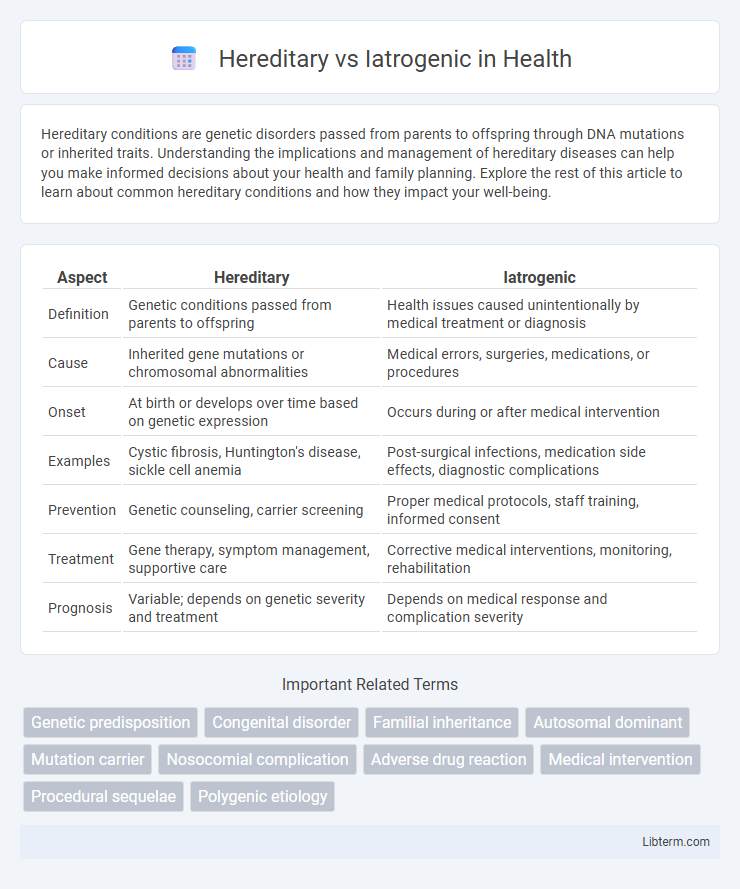Hereditary conditions are genetic disorders passed from parents to offspring through DNA mutations or inherited traits. Understanding the implications and management of hereditary diseases can help you make informed decisions about your health and family planning. Explore the rest of this article to learn about common hereditary conditions and how they impact your well-being.
Table of Comparison
| Aspect | Hereditary | Iatrogenic |
|---|---|---|
| Definition | Genetic conditions passed from parents to offspring | Health issues caused unintentionally by medical treatment or diagnosis |
| Cause | Inherited gene mutations or chromosomal abnormalities | Medical errors, surgeries, medications, or procedures |
| Onset | At birth or develops over time based on genetic expression | Occurs during or after medical intervention |
| Examples | Cystic fibrosis, Huntington's disease, sickle cell anemia | Post-surgical infections, medication side effects, diagnostic complications |
| Prevention | Genetic counseling, carrier screening | Proper medical protocols, staff training, informed consent |
| Treatment | Gene therapy, symptom management, supportive care | Corrective medical interventions, monitoring, rehabilitation |
| Prognosis | Variable; depends on genetic severity and treatment | Depends on medical response and complication severity |
Understanding Hereditary vs Iatrogenic: Key Definitions
Hereditary conditions are genetic disorders passed from parents to offspring through DNA mutations, affecting multiple generations within a family lineage. Iatrogenic conditions result from medical interventions or treatments, such as surgery, medications, or diagnostic procedures, leading to unintended adverse effects. Understanding the distinction between hereditary and iatrogenic factors is crucial for accurate diagnosis, patient management, and preventive strategies in clinical practice.
Genetic Inheritance: What Makes a Condition Hereditary?
Hereditary conditions result from genetic mutations passed from parents to offspring through DNA, typically involving autosomal dominant, autosomal recessive, or X-linked inheritance patterns. Genetic inheritance determines the likelihood of a condition manifesting based on specific gene variants inherited from one or both parents. Iatrogenic conditions, in contrast, stem from medical interventions or treatments rather than genetic transmission, and therefore do not involve hereditary mechanisms.
Iatrogenic Causes: When Treatment Leads to Health Issues
Iatrogenic causes refer to health complications directly resulting from medical treatment or intervention, such as adverse drug reactions, surgical errors, or hospital-acquired infections. Unlike hereditary conditions passed genetically, iatrogenic illnesses arise from diagnostic procedures, medications, or therapeutic interventions that unintentionally harm patients. Recognizing iatrogenic factors is essential for optimizing patient safety and minimizing risks associated with healthcare delivery.
Major Examples of Hereditary Disorders
Major examples of hereditary disorders include cystic fibrosis, sickle cell anemia, and Huntington's disease, each caused by genetic mutations passed from parents to offspring. Iatrogenic conditions arise from medical treatment or diagnostic procedures, such as drug-induced lupus or surgical complications. Understanding the distinction between hereditary and iatrogenic disorders is crucial for accurate diagnosis and targeted treatment strategies.
Common Iatrogenic Conditions in Modern Medicine
Common iatrogenic conditions in modern medicine include medication errors, surgical complications, and hospital-acquired infections, which arise from medical interventions rather than genetic inheritance. These conditions often result from adverse drug reactions, incorrect dosages, or procedural mistakes during treatment. Understanding the distinction between hereditary disorders caused by genetic mutations and iatrogenic conditions is crucial for effective diagnosis, prevention, and patient management.
Risk Factors: Genetic Predisposition vs Medical Intervention
Hereditary risk factors involve genetic predisposition passed through family lineage, increasing susceptibility to specific diseases due to inherited gene mutations. Iatrogenic risk factors arise from medical interventions such as surgeries, medications, or diagnostic procedures that inadvertently cause harm or complications. Understanding the distinction between genetic predisposition and medical intervention-related risks is crucial for personalized patient management and preventive strategies.
Diagnostic Approaches: Identifying Hereditary vs Iatrogenic Origins
Diagnostic approaches for distinguishing hereditary from iatrogenic conditions involve genetic testing and detailed patient history analysis. Genetic testing, including whole exome sequencing and targeted gene panels, identifies inherited mutations linked to hereditary disorders. In contrast, iatrogenic conditions are primarily diagnosed through clinical correlation with medical interventions, medication history, and temporal association with healthcare procedures.
Prevention Strategies: Genetic Counseling vs Medical Best Practices
Genetic counseling plays a crucial role in hereditary disease prevention by assessing family history, identifying at-risk individuals, and guiding reproductive decisions to reduce inherited disorder incidence. In contrast, iatrogenic harm prevention relies on strict adherence to medical best practices such as standardized protocols, comprehensive patient monitoring, and minimizing invasive procedures to avoid treatment-related complications. Integrating genetic risk assessment with evidence-based clinical guidelines enhances overall patient safety and reduces both hereditary and iatrogenic health risks.
Patient Perspectives: Living with Hereditary or Iatrogenic Conditions
Patients living with hereditary conditions often face lifelong management challenges, including genetic counseling and regular monitoring for associated health risks. Those affected by iatrogenic conditions, caused by medical treatments or interventions, frequently experience feelings of frustration or mistrust towards healthcare providers, emphasizing the need for transparent communication and supportive care. Both groups highlight the importance of personalized treatment plans and psychosocial support to improve quality of life and coping strategies.
Future Directions: Research and Innovations in Understanding Causes
Future research in hereditary and iatrogenic conditions is exploring advanced genomic sequencing and biomarker identification to unravel complex genetic predispositions and treatment-induced pathologies. Innovative technologies such as CRISPR gene editing and personalized medicine aim to minimize iatrogenic risks by tailoring interventions based on individual genetic profiles. Continued integration of big data analytics and machine learning enhances predictive models, facilitating early detection and prevention strategies for both hereditary diseases and iatrogenic complications.
Hereditary Infographic

 libterm.com
libterm.com